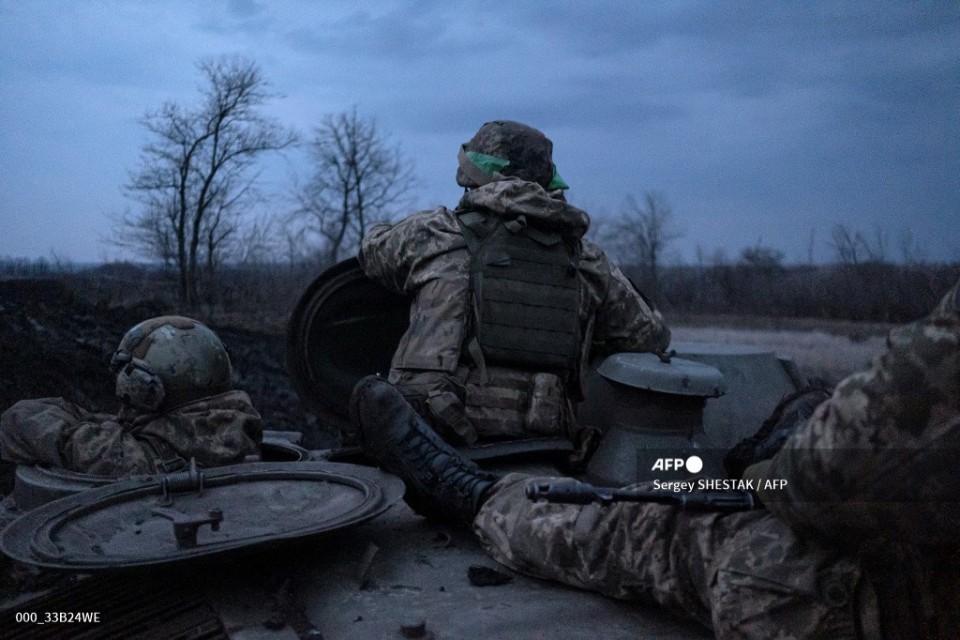
Paris, France | AFP | Friday 4/21/2023
by Didier Lauras with Anna Malpas in Kyiv
Russia’s far-right groups have splintered over the war in Ukraine, with some of them now fighting alongside Kyiv’s forces and organising moves to embarrass the Kremlin.
In March, the Russian Volunteer Corps (RVK) came out of the woodwork when it claimed responsibility for a violent incursion in Russia’s Bryansk border region.
The group represents a “complex mixed threat of cross-border sabotage operations and domestic partisan attacks”, according to Lucas Webber, of the Militant Wire research network.
“This makes it very difficult for Russian intelligence and security services to disrupt these actions. It also makes it hard to verify the claims of any one or combination of these elements without hard evidence.”
Other ultra-nationalist groups have remained loyal to Russian President Vladimir Putin, including the White Power Ranger Squad (WPRS) and Rusich, as well as the Russian Imperial Movement or the Citizens of the USSR.
Limited in membership, groups on both sides bring together radical pan-Slavic, neo-pagan, imperialist and anti-Semitic individuals, some of whom are also football hooligans or mixed martial arts enthusiasts.
– Split from Kremlin –
Moscow has not only tolerated these extreme nationalist groups since the Bolshevik Revolution of 1917, but also instrumentalised them.
“If you want to break up a demonstration, to toughen up your security forces at a rally, you can hire them,” said Kacper Rekawek, a researcher for the Counter-Extremism Project (CEP), a US-based charity.
“They’ve been used to target Russian liberals, the Russian opposition, Russian democrats, to simply beat them up. They are used to do the dirty job for others. They’re not independent actors in that sense,” he added.
But these groups split in 2014 when Russia invaded Crimea and began fomenting a pro-Russian insurgency in the Donbas in eastern Ukraine.
This led some far-right groups to flee abroad to Ukraine and Belarus, while others — which backed the invasion — stayed in Russia.
“The ones who are in Russia now are those who took the party line a few years back,” added Rekawek.
Since the February 2022 invasion of Ukraine, called a “special military operation” by Putin, the conflict “has pushed all other issues off the agenda”, wrote Natalia Yudina on the website of Moscow-based Sova, which tracks xenophobia.
“Their views, as in 2014, split, though this time the majority of the ultra-right ended up supporting the ‘special operation, even if many of them have harshly criticised how it is being conducted,” she added.
Those who had crossed the border to Ukraine as early as 2014, like the RVK, often had fellow far-right friends in Ukraine or family.
It is unknown how many people took this route, but they are estimated to number several hundred and some of them have fought in the Donbas.
– ‘We are fighting the Kremlin’ –
During an interview over Zoom, a member of the RVK, who gave his name as Alexander, alias “Fortune”, told AFP about how the group operates.
“Now we are developing actively, we’re expanding… we’re taking part in special operations along the whole frontline,” he said.
“We are fighting the current Kremlin regime, against which we have been fighting practically all our adult life.”
He described the RVK as an independent unit outside Ukraine, but as “directly subordinated” to the Ukrainian ministry of security on the front.
“At first it (RVK) was just a brand,” he admitted.
“In August, we announced the creation of a unit. We equipped ourselves with media instruments… And we began to dedicate our lives to the unit”.
In Saint Petersburg in August, another far-right group, calling itself the National Republican Army (NRA), claimed responsibility for an attack which killed Daria Dugina, daughter of an ideologue close to the Kremlin.
But “one should be sceptical of any NRA claims about the attack,” said Webber from the Militant Wire research network.
US intelligence concluded that parts of the Ukrainian state were involved in the killing of Dugina, the New York Times reported at the time.
“The NRA exists at least as a media force and has maintained a presence on Telegram for months. Part of the group’s purpose is to inspire and incite domestic Russian partisans to take direct action,” Webber continued.
“It is possible the NRA is mostly a psychological warfare operation without any meaningful militant apparatus capable of carrying out significant operations.”
– ‘Risky’ –
Several supremacist groups are also fighting for Russia, such as the WPRS or Rusich, which have been linked to the private paramilitary group Wagner.
The Soufan Center, a New York-based think-tank specialised in security issues, said it is “unclear at this time if WPRS operates as a cohesive, standalone force in Ukraine or if its members have joined and are scattered throughout the Russian military”.
It added that WPRS members “have been seen training with a variety of customised weapons and wearing thermals, indicating access to high-quality weapons and equipment, often of Russian military grade”.
Both pro-Moscow and pro-Kyiv far-right groups risk posing a serious security threat at the end of the conflict.
Pro-Russians could turn on a regime that used them as a fighting force but then disappointed.
Those fighting alongside Ukraine could end up being a menace for pro-Western Ukrainian President Volodymyr Zelensky whose defence forces have enrolled them.
Zelensky “needs everyone he can supporting him and fighting on his side,” said Raffaello Pantucci, a researcher at the S. Rajaratnam School of International Studies in Singapore.
But “it’s incredibly risky for any country to try to manipulate proxy groups like these and to think you can control them because what we’ve continuously seen in the past is that it does not work,” he added.
“This problem never ends well.”
© Agence France-Presse








